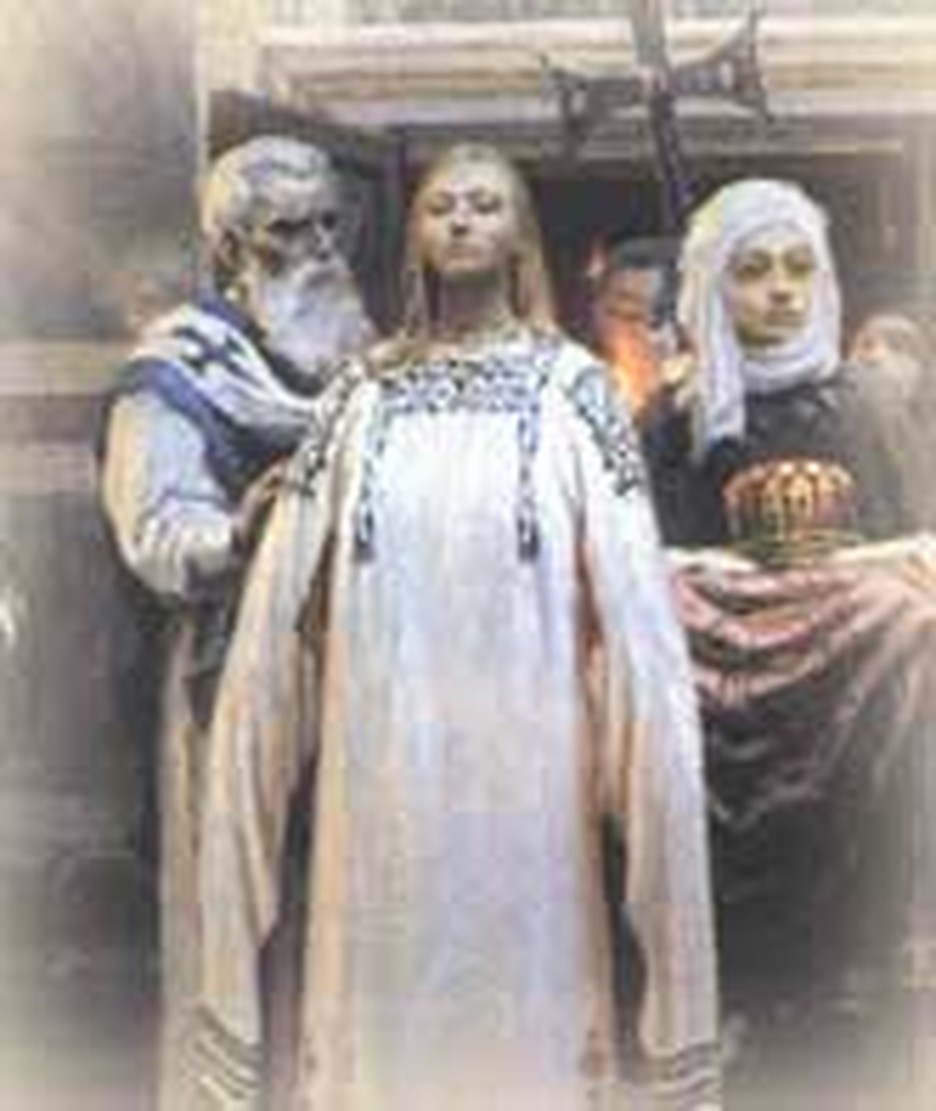
Behind every great man stands a woman," goes the saying. In a real sense that was true of Vladimir, Prince of Rus (the Ukraine). Credited with Christianizing the Ukraine, Byelorussia and Russia, Vladimir was following in the steps of his grandmother, Princess Olga of Kiev, who attempted the task earlier and can be given partial credit for preventing the region from turning Islamic.
Olga, who is believed to be a Viking descendant, became regent for her son Svyatoslav in 954 upon the assassination of her husband, Igor I, Prince of Kiev. His costly wars had brought Rus to ruin. She immediately executed his murderers and ruled for the next twenty years, implementing fiscal and other reforms throughout the principality. Possibly already a convert to Christianity, she visited Constantinople and was baptized there in 957. She returned to Kiev with a Christ-like hunger for souls and attempted to lead her people to Orthodoxy. At the same time, she sent envoys to Rome, requesting teachers be sent to train her people in the faith. Led by her son, Svyatoslav, the pagan nobles resisted Christ and her efforts failed. Svyatoslav himself almost converted to Islam. Byzantium diplomacy averted that danger. No doubt Olga's influence had a hand. Certainly she had created a political faction which was interested in seeing Rus Christianized.
Olga died in 969. Her pagan son allowed her to have a Christian burial. She is recognized as a saint in both the Catholic and Orthodox churches. Her feast date is on this day, July 11th.
Her grandson Vladimir began his reign as a cruel playboy. He was, however, wise enough to recognize that a common faith would help unite his country. According to legend, he sent messengers to investigate the three great faiths of the Mid East: Islam, Judaism, and Christianity in its Roman and Orthodox forms. The epicure in Vladimir thought Judaism and Islam, with their dietary restrictions, undesirable. He found Roman Catholicism "too simple." But his messengers persuaded him with their report of the ritual they witnessed in Byzantium. Speaking of the worship they saw in the Hagia Sophia they said, "We did not know whether we were in heaven or on earth. It would be impossible to find on earth any splendor greater than this. . .Never shall we be able to forget so great a beauty."
Vladimir embraced Orthodoxy and wed Anna, sister of a Byzantine emperor. After his marriage and conversion he is reported to have changed direction, to have put away former wives and to have become kinder. At any rate, the Christianity Olga had tried to transplant to Rus now took root. Vladimir's subjects did not balk for him as they had for her. In time the whole of Northeastern Europe and North Asia was Christianized. One man's personal tastes and political cunning had added a precious jewel to the kingdom of Christ. Russian orthodoxy, the direct result of Vladimir's conversion, came to rival the Greek in its extent, prestige and arts.
Bibliography:
- Encyclopedia Britannica. Chicago: Encyclopedia Britannica, Inc., 1967.
- Curtis, A. Kenneth, J. Stephen Lang, and Randy Petersen. Dates with Destiny; the 100 most important dates in Church History. Tarrytown, New York: Fleming H. Revell, 1984.
- Eerdman's Handbook to the History of Christianity. Editor Tim Dowley. Berkhamsted, Herts, England: Lion Publishing, 1977.
- Millennium of Russian Christianity. Christian History Magazine #18.
- Neill, Stephen. A History of Christian Missions. The Pelican History of the Church #6. Hammondsworth, Middlesex, England: Pelican Books, 1964.
- "Olga, St." The Catholic Encyclopedia. New York: Robert Appleton, 1914.
Last updated April, 2007.


